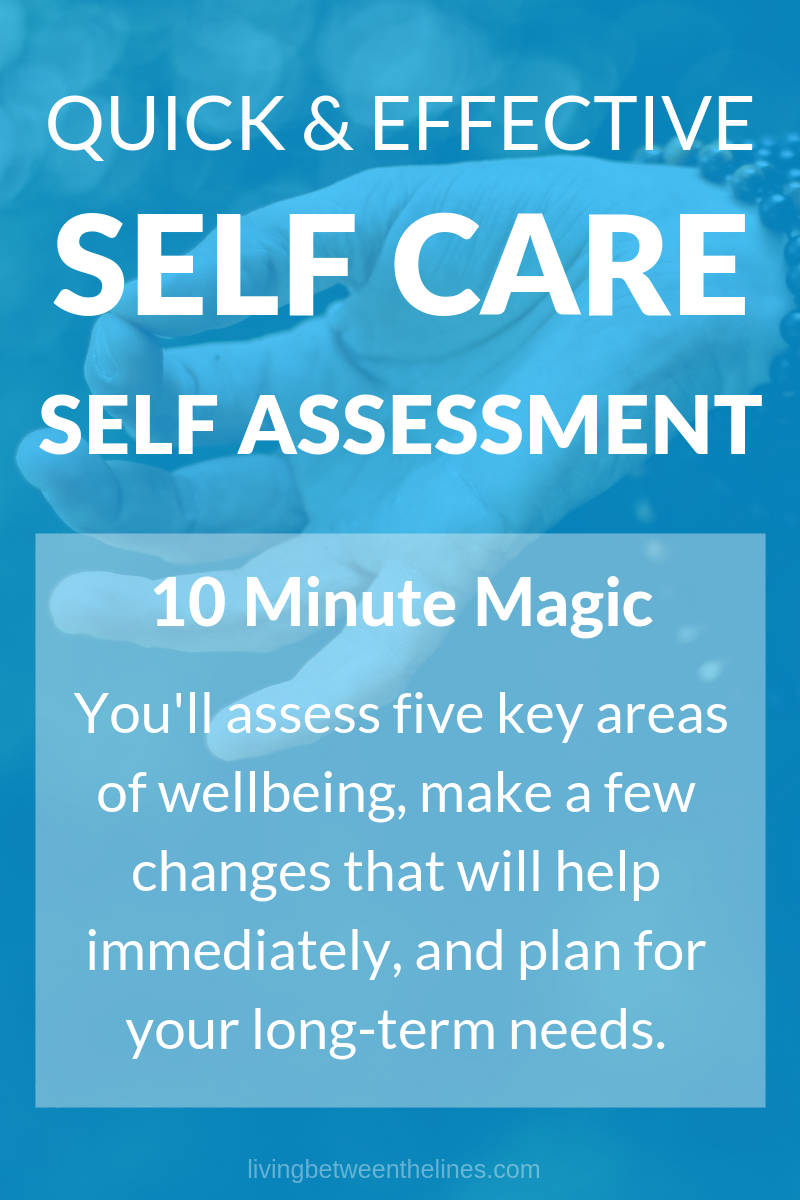I’ve talked about this before, but people throw the word “self care” around a lot lately. On one hand, it’s amazing to see society start to value personal wellbeing! On the other, jeez, some of the self care advice out there is bad. The ‘bad’ stuff ranges from self-indulgent to downright destructive.
However, one of the major issues with self care advice is that self care is so intensely personal. Because of this, what’s helpful for you may be ineffective for someone else, and harmful to yet another person. Good self care requires a certain level of mindfulness and self awareness that can be difficult to cultivate.
Luckily, 10 Minute Magic articles are focused on quick, thorough introductions to practices that will help you live a better life, and this one is no exception.

What follows is a self care self assessment. Before you begin, you’ll need:
- Something to write with
- Something to write on
Each section will begin with a list of questions. Answer each question on paper before moving on.
Each section will end with a large-text statement asking you to take a moment and complete a task. Actually take that time, and complete that task, before reading on. This will slow you down, and that’s okay, that’s the point. If you intend to speed-read through the whole article now and put it into action later, reconsider: it’s best to take this one as it comes!
Environmental
Are you…
- Safe? If you’re not somewhere safe, stop reading this blog post and start taking action immediately. If your home is unsafe due to abuse, there are resources! Visit here for a varied list of hotlines. If your current environment is dangerous, seek out somewhere public but safe, like a café or library. I hope this question is never relevant for any of you, but if it applies, please prioritize yourself.
- Comfortable? How’s your posture? Is your seat comfy? Is the light to bright or harsh? Or maybe it’s dim, and the screen is straining your eyes.
How’s the ambiance? If it’s loud and distracting, try to move somewhere quiet to complete your self-assessment. If it’s too quiet, put on some instrumental music or something soothing. If it’s crowded around you, you may feel more comfortable alone.
Even if you don’t have complete control over your environment in a school or office setting, you can always take some steps to improve it. If your cubicle feels like a prison, some personal art or a potted plant can actually go a long way. If you’re a student, it’s worth leaving for class a few minutes early to ensure you’re able to get a decent seat with a good view of your instructor.
Take a moment to identify the parts of your environment that are uncomfortable, and address them as needed.
Physical
When was the last time you…
- Took any necessary medications or supplements?
- Drank a glass of water? No matter you answer is – drink a glass now!
- Ate a healthy meal or snack? Fruits, nuts, and vegetables are always a good bet.
- Checked your posture?
- Stretched?
It’s easy to neglect your physical comfort when you’re busy. You may be carrying tension in odd ways, like grinding your teeth or slouching. Fostering an awareness of your body – even when your brain is going 1 million miles per hour – will help you stay more comfortable, and more productive as a result.

You’ve probably hear it before, but many people mistake thirst for hunger! Before you reach for a snack, drink a full glass of water. If you’re still hungry after your drink, consider what you would and wouldn’t eat. If you’d pass on a healthy snack like a handful of nuts, a banana, or baby carrots, you’re not actually hungry, you just want to eat. I can relate! But it’s best to skip out on unnecessary snacks.
Take a moment to enjoy a glass of water, and consciously relax. Address any physical needs you’ve been neglecting.
Mental
Follow each of these steps:
- Close your eyes. Breathe in for a ten count, then out for a ten count. Repeat this for ten breaths. This may feel like it’s taking forever. Do it anyway!
- Write a to-do list for the next hour. Prioritize each item, and estimate how much time each task will take. Note whether you were realistic in how much you could achieve.
- Write down three things you are thinking about, three things distracting you, and three words to describe your current mindset.
Your mental wellbeing is critical. That’s why so much of self-care focuses on self-reflection and meditation. The goal is to care for your mind. For some people, that means whalesongs and guided meditation. For others, it just means a few deep breaths and a better-organized to-do list.
No matter what you choose to do, the goal is to cut down on negativity, stress, and overwhelm. You want to re-focus on what’s important, and shut out the noise and clutter that’s distracting you.
A brain dump is actually a great form of mental self-care. That “too many tabs open” feeling in your brain sometimes comes from the sheer amount of stuff you’re trying to remember. If you clear it out, you’ll find you have a lot more mental resources to work with.
Take a moment to clear the clutter out of your brain by writing down all that stuff you’re trying not to forget.
Emotional
Write down…
- Three things you’re worried about.
- Three things you’re thankful for.
- The last thing that made you laugh.
- The last thing that made you cry.
- The last thing that made you REALLY angry.
- The last time you gave/got a hug.
Emotional self-care can feel a little woo-woo to some people, so we’re keeping it simple. Write down the six things above, and sit with your answers for a few minutes. Seriously, put down the phone, don’t open something new to read or watch, don’t distract yourself. Just sit and look at your answers, and think about which of them are most significant.
It’s difficult to set aside time for self-reflection. But without taking this time, we may push our feelings to the side and refuse to address them. Some people swear this works, and for some issues, it may. But if you got a nagging “something’s not right” feeling while writing any of the above answers, it bears further thought. Highlight anything you’d like to follow up on.

There have definitely been times where it’s difficult for me to stop at just three things I’m worried about, and hard to remember when the last time I laughed. That’s when I know some more serious emotional self-care is necessary. That can mean a long journal entry, a heart-to-heart with a friend, or just a long snuggle sesh with my pup.
Take a moment to look over your answers to the questions above, and think about anything that’s seriously bugging you. How can you improve it right now?
Social
- Reach out to a family member. This can be to check on them, or tell them what you’re up to. Feel free to call, text, email, snail mail, smoke signal, whatever.
- Check in on a friend. If you’re feeling overwhelmed, no need to get into a deep convo. Just send them a video or article that makes you think of them.
- Schedule any appointments you’ve been putting off. Doctor’s, dentist’s, advisor’s, hairdresser’s, etc.
Even if you’re the most dark-room-and-Netflix loving introvert around, you still have social needs. Whether you’re in college or your career, it’s easy to be so busy you neglect your relationships with others. This can be a huge factor in the general stress and anxiety of your life.
Keeping in touch with your family (biological or otherwise) and friends helps maintain your support network. If you’re ever in crisis, these are the people you’ll lean on. And, loathe though you may be to admit it, we live in a society where we rely on the services of others. Stay on top of your social obligations to cut down on unnecessary stress.
Take a moment to think about your support network, what you need from them, and what they need from you.
Final Notes
If you’ve been following along with the post, you’ve likely already gotten a good handle on where you’re at, and what forms of self care would be most beneficial to you. That said, just sitting here, taking this self assessment is a form of self care. You’ve spent the past ten-ish minutes focused on yourself, your feelings, and your needs. That’s a sort of mindfulness that people neglect far too often.
Do Right Now
Since most of the post was active, your “Do Right Now” list is one you wrote yourself. If you’re looking for one last self care activity, this beginner’s level guided meditation is a great way to close out your period of self reflection:


